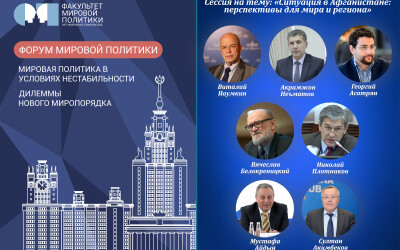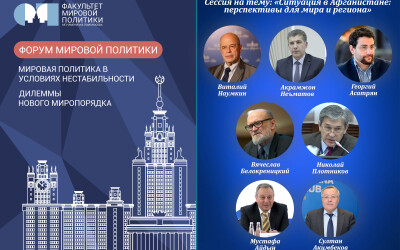The initiative of the President of Uzbekistan to hold regular high-level meetings in the SCO-Afghanistan format is gaining special relevance

First Deputy Director of the Institute for Strategic and Regional Studies under the President of the Republic of Uzbekistan Akramjon Nematov pointed out the importance of using the potential of the SCO in stabilizing the situation in Afghanistan in his speech at the international conference «World politics in conditions of instability. Dilemmas of a New World Order», the first organized by Moscow State University with the participation of prominent scientists, diplomats, politicians, experts and heads of leading universities.
Today, the SCO family unites more than 20 states in the status of members, observers or dialogue partners, including all of Afghanistan's neighbors and two members of the UN Security Council. The SCO member states account for almost 80% of the total foreign trade turnover of Afghanistan ($ 11 billion), almost 100% of imports of electricity, wheat and flour.
In this regard, according to the expert, the initiative of the President of Uzbekistan Shavkat Mirziyoyev, put forward at the SCO-CSTO summit in Dushanbe, on the regular holding of high-level meetings in the SCO-Afghanistan format, is acquiring special relevance. This format is expected to involve observer states and dialogue partners, including Armenia, Azerbaijan, Turkey, Cambodia, Nepal, Egypt, Qatar and Saudi Arabia.
A.Nematov believes that such a representative format will make it possible to develop common approaches and establish closer coordination of efforts in ensuring security and the speedy recovery of the Afghan economy.
«At the same time, we understand that a theocratic state is being established on the borders of Central Asia. The takeover of Afghanistan by the Taliban and the failure of democratic reforms have led to an increase in the propaganda of radical Islamist ideology. The Taliban’s victory inspired several religious groups around the countries of the region and world. It is important to prevent penetration into the countries of the region and the strengthening of the influence of radical ideas», he stressed.
In this regard, the first deputy head of the ISRS considers it important to accelerate the development, on the basis of the CIS Anti-Terrorist Center, of the Cooperation Program in the field of deradicalization, which was initiated by the Uzbek leader during the summit of the CIS Heads of State in 2020. A similar work could be launched within the framework of the SCO RATS with the participation of Afghanistan.
According to the expert, it is necessary to envisage the possibility of joint research on the issues of radicalization and extremism in Central Asia, taking into consideration the current realities in Afghanistan and the interaction in training personnel for religious life should be taken to a new level. In this regard, it can be considered the huge experience of the religious institutions of Uzbekistan, the potential of Uzbek theologians accumulated over the years.
The International Conference «World politics in conditions of instability. Dilemmas of the New World Order» is organized by the Lomonosov Moscow State University.
Within the framework of three sections, 8 sessions, roundtable discussions and seminars, more than 50 prominent scientists, experts, politicians and diplomats presented their reports. Rector of Moscow State University Viktor Sadovnichiy, Academician of the Russian Academy of Sciences Viktor Naumkin, President of the Faculty of World Politics of Moscow State University Leonid Slutsky, Deputy Minister of Foreign Affairs of the Russian Federation Sergey Ryabkov, Head of the Department of Regional Problems of World Politics of the Faculty of World Politics of Moscow State University Vitaly Naumkin, Head of the Department of Political Theory of MGIMO Russian Foreign Ministry Tatyana Alekseyeva, Dean of the Faculty of World Politics at Moscow State University Andrey Sidorov, President of the Turkic Council for International Affairs Aydin Mustafa, Director of the Institute of Asian Studies (Kazakhstan) Sultan Akimbekov, and others delivered speeches on the current issues of international politics.
Previous

First Deputy Director of the Institute for Strategic and Regional Studies under the President of the Republic of Uzbekistan Akramjon Nematov expressed approaches to building a pragmatic and constructive dialogue with the Taliban in his speech at the International Forum «World politics in conditions of instability.
02.12.2021Next

First Deputy Director of the Institute for Strategic and Regional Studies under the President of the Republic of Uzbekistan Akramjon Nematov speaking at the international conference «World politics in conditions of instability. Dilemmas of a New World Order»...
02.12.2021





